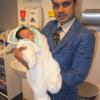A new more accurate and safe screening test for Down’s syndrome may soon be offered to pregnant women by the NHS. The new technique carried out with a blood test is called non-invasive prenatal testing (NIPT) and it can predict whether a baby has Down's and also screen for the rare genetic conditions Edward's syndrome and Patau syndrome. The test is 99 per cent accurate, and means women do not have to undergo any further invasive tests.
NIPT is currently only available in private hospitals but is being considered for use by the NHS by the UK National Screening Committee. A scientific impact paper published by the Royal College of Obstetricians and Gynaecologists (RCOG) also supports offering the procedure to all women who want it in early pregnancy.
Professor Peter Soothill, Consultant in foetal medicine at the University Hospitals Bristol NHS Foundation Trust and author of the scientific impact paper, said: “This is the most exciting development in pregnancy care in many years.
“The new test is so accurate that the number of women who will need invasive tests is going to fall very dramatically while still informing those who wish to know about chromosomal abnormalities.
“The test is not yet available on the NHS but we think it will become a primary screening tool for all women who wish to know about foetal chromosomal abnormalities.”
However, the experts pointed out that one disadvantage is that pregnant women may occasionally be informed of findings of uncertain significance, such as when there is a discrepancy between the chromosomal make-up of the cells in the placenta and the cells in the baby.
Dr Sadaf Ghaem-Maghami, Chair of the RCOG’s scientific advisory committee, said: “The potential for this technology is exciting and will provide much more accurate results for pregnant women. However, it is important that there are resources and training for health professionals offering this testing and an emphasis on discussions with the pregnant woman before the test about the implications of the results.”
Senior Consultant Obstetrician & Gynaecologist, Mr Ashok Kumar agreed and commented: “A new screening tool that removes the need for invasive and potentially dangerous tests is welcome. However, it does carry an added responsibility for health professionals to ensure that pregnant women completely understand the implications of the test and that they are completely supported whatever the results may be.”
About 750 babies with Down’s syndrome are born in the UK each year.



